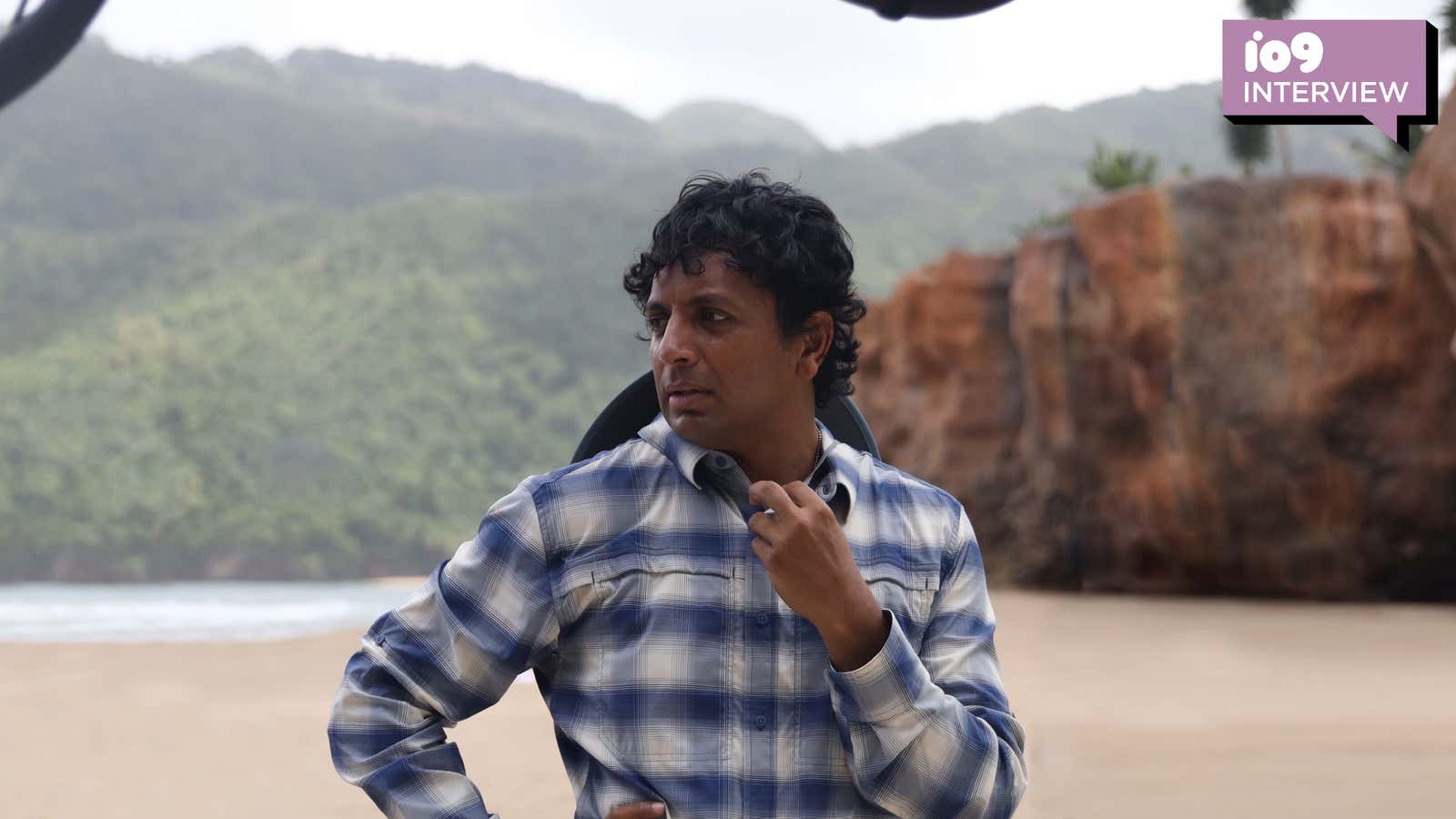Twelve hours after watching Old, the latest film from M. Night Shyamalan, I couldn’t shake it. It was sitting with me... lingering... haunting. Shyamalan is known for making smart, twisty-turny thrillers, but Old adds a brand new dimension: a punishing, unrelenting intensity. Truly, it borders on sadistic. So when I got a chance to talk to him about it, I was unsurprised to find that was exactly the point.
The director behind The Sixth Sense, Unbreakable, and The Village has already surprised you, and now he wants to squeeze you until you can’t take it anymore. Old does exactly that. The film follows a family that, while on vacation, ends up on a mysterious beach where time doesn’t work as it should. Years go by in minutes and soon, little kids are teenagers, adults are senior citizens, and no one has any idea what’s going on, or if it can be stopped. Along the way, you’ll think about living in the moment, and the meaning of family, friends, and so much more. But mostly you’ll just be riveted. Here’s my chat (edited for clarity) with the man who, 12 hours prior, messed me up good.
Germain Lussier, io9: Man, Old was so intense. I think it’s probably the most intense thing I’ve ever seen you do. It’s relentless and never lets up. So I think that’s where I want to start. How do you go about balancing the tension and making sure that it’s impactful and emotional, but not painful? Because it really toes that line.
M. Night Shyamalan: You know, it’s funny you say that. I think in my head, when I thought of doing the movie, I thought of it as this relentless, tumbling, thing. In my head, I’m like, “It should be like 100 minutes long and it should just tumble tumble tumble because you should be feeling what the characters are feeling like.” So much happens so quickly that I can’t even keep up with it. Only in retrospect you kind of internalize it, so as we were editing it, we would squeeze it and squeeze it until it had just that sharpness where I had just enough time. And sometimes we went a little too tight and then we opened it back up. The audience needs just that moment to take a breath here for a second so that they [breathe], then the next horror starts to happen. That calibration is kind of like hearing it back and forth. Iterate, iterate. I do like, I don’t know how many passes I did. Eighteen? Eighteen passes of the movie to get to the cadence that eventually found this movement, this breathing movement or lack of breathing so you’re like this [tenses up his body]. You should feel, when the movie’s done, “Oh man. My body has been like this for so long” and now when you move it you’re like, “Oh wow. I didn’t realize my body was doing this for so long.”
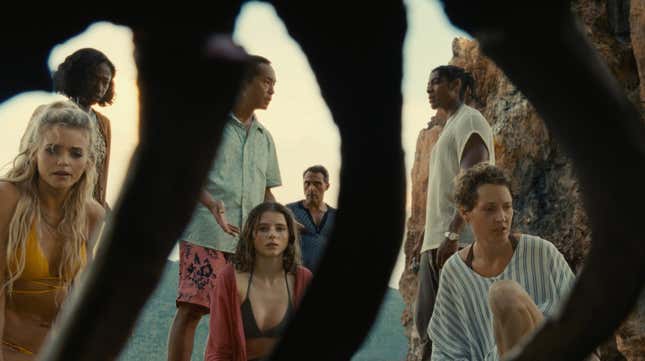
io9: Well you calibrated that right, trust me. And a lot of it also comes from the editing, of course, and the music. But the camera angles and the shot choices throughout are fascinating too and really unsettling. Tell me a bit about your thought process with the canted angles, the close-ups, the off-balance compositions, and stuff like that.
Shyamalan: I had a lot of time to really think through how I wanted to shoot it and draw everything very, very meticulously. This happened on Sixth Sense as well where I thought I was going to shoot at a time and then I got punted because of Bruce Willis’ schedule, and I spent more time on the shots. This exact thing happened because of the pandemic—we bumped from May to the fall, so I just kept thinking and working the shots. Mike [Gioulakis, the director of photography] and I were on Zoom constantly. I would draw and hold it up and say, “How about this?” or “How about that?” and there was always a principle to it. It isn’t just kind of, “Oh, this is a cool shot.” In fact, we use that as a pejorative thing. When I say to Mike “Oh that’s a cool shot,” we’re like, “Oh, man. That’s getting cut.” That can’t be the reason to do it. It has to have language.
Some of the things you’re probably feeling are one of the principles in that the camera moves independently of the events that are happening in the movie. So it represents time in that way of it’s not stopping on you for your line [of dialogue], it just happened to go by you. If we catch it, we catch it. You get this feeling of it’s moving irregardless of the events that it’s watching. And whether it’s a zoom that’s pushing past everyone or a dolly that’s just continually spinning past them and you’re catching off-screen very important lines and stuff like that, that was an important way to represent time in the piece with our camera movements.
io9: Yeah, absolutely. It works really, really well. Now, I saw it fairly recently, within the past 12 hours. So I’m still processing everything. But while it really does make you think about different aspects of life, the thing that’s sticking with me most is the disturbing implications of aging in a day. In your mind, what are the most disturbing possibilities about this scenario, if it actually could happen?
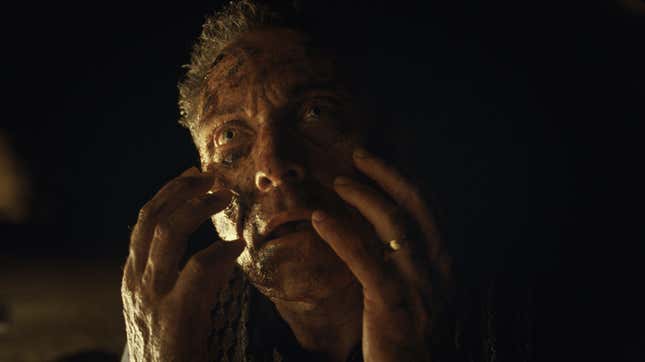
Shyamalan: You know, it’s funny. The more I thought about it, for me, often times these movies are me working out something. So me trying to figure out how to internalize my parents getting very, very old. The kids becoming adults. How do I internalize all this and what my struggle is? I’m trying to hold on to something. I’m trying to hold on to the kids when they were babies and I could just tuck them in and I knew where they were, and my parents who were always there and I could go to them for advice, and they would take care of me even when I was adult. They would take care of me, but then that has flipped. Me holding on to things. I think by the making of the film, then watching it, you have to let go. Otherwise, your life’s a nightmare. You have to let go and be in that particular moment and not think about if this is going to happen to me in a few minutes or this was the thing I lost from a few minutes ago. That keeps you in this hell and I think the characters that are always trying to escape time and escape that beach end badly.
io9: Oh that’s for sure. OK so, obviously you’re known for films with big twists. So when you have a movie like this that feels like it could have one [but I won’t say either way], is that expectation a burden or is it a blessing? Can you use that to your advantage?
Shyamalan: Honestly, it’s not one that bothers me because it is my natural cadence of telling stories. I really enjoy it as a viewer, as a storyteller—to unfold things is exciting for me. I think it would be different, let’s say, Sixth Sense... it would be different if Sixth Sense was a book that I happen to adapt. Now I’m like, “Oh, man, they want me to do that?” But that’s naturally how I think. And so Unbreakable and Signs, The Village, it just feels very natural, that cadence. It isn’t something that feels outside of me, I like unfolding stories. In fact, the fun part, for me, of writing stories is picking out the format of how to tell the story. If the story is about you being a killer, how do I tell that story? Is it from your point of view? Your wife’s point of view? Your neighbor’s point of view? When exactly do I find that out, is fun. That’s fun. The storytelling part.

io9: That kind of brings me to my next question. For the sake of the movie, you put the characters through some horrific situations. So, what was your most enjoyable or most kind of evil discovery in writing? The thing that that you’re like, “Oh, man, am I really going to do this?” And you do it.
Shyamalan: Well, I knew what happens in the cave at the end was going to be kind of like the nightmare Gothic thing, because I remember thinking, “Wow, you know, if time was moving that fast, if you broke a bone, that would be really weird. Right.” [Laughs] So I just kind of went with that and went, wow. By that point in the movie, I loved spinning all the ramifications of time in kind of grotesque ways that would happen to you immediately. I guess maybe because my family’s all doctors, those are the first ideas that came to my head was all the kind of medical stuff.
io9: Yeah, I described the other medical scene to my wife, who is very squeamish and she’s like, “Just stop talking. I don’t even want to hear about it.” And I said, “Imagining watching it!” Shifting a bit, high-concept, contained movies like this are kind of rare in Hollywood and the studio system. Why do you think that is and how do you continue to get to make them while so few other people are?
Shyamalan: Dude, I don’t know the answer to that. It’s changed so much since 1999. When I did the first one, everyone was doing it. That was an amazing year. That was The Matrix and Blair Witch and Magnolia and Being John Malkovich and American Beauty and I could keep on going. That was just the big movies. Those were the big movies. You know, my hope is that there’s certain things that bring people to the movie theaters now because there’s so many other formats to see. And my hope is that uniqueness, originality, being different is one of the reasons to leave your house and come see [a movie]. When I promote our movies and with our marketing partners at Universal, I say “Make it feel so different that they can’t not see it.” As much as we can, celebrate what’s different about it. That’s our weapon, it’s Not Packagable by nature. That’s the thing to celebrate and make them go “Oh yeah, I remember that movie. I want to go see that.” Whenever I see a trailer or promotion and I go, “Oh, I know what that is, I’m good,” I don’t give them the option to do that. It’s like “I don’t know what that is.”
io9: Yeah, this is that for sure.
Shyamalan: I am hopeful, to answer your question, that there will be lots of those in the marketplace.
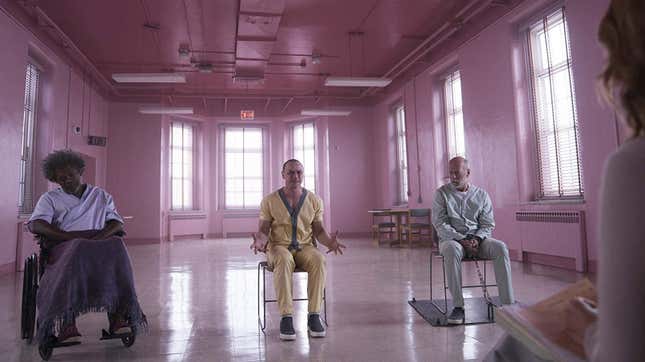
io9: Me too. Now, I’m a huge fan of Eastrail trilogy and Glass obviously put a period on it. But, you know, so did Unbreakable. So at some point, could you pull a Split and come back to that world or are you just completely done with it?
Shyamalan: Look, if I did it, I would never tell you now, right?
io9: That’s a great point.
Shyamalan: [Laughs] But honestly, I’m not a big sequel guy. And I think the reason I’m not a big sequel guy is that the primary thing that gets me to make a movie is this thing we’re talking about. I’ve never seen that or I’ve never done that. And so I want to try this new color. So by its nature, what gets me going is that it’s original.
io9: Sounds good. Now I saw on Instagram you’re writing a new movie and I know you won’t tell me anything about it, which is absolutely fine. But what I’m wondering is, what drives you? What makes you think “Well, Old is done, I’m doing press this weekend and now I’m on to the next thing”?
Shyamalan: I think the healthiest relationship that I can have with my art form is putting all my love into it. Understanding the relationship between that piece of art and the audience. What that relationship wants to be, what’s the best form of it? Put all my love into it and then don’t worry about the outcome and move on to the next story. The less I think about it as a business proposition and the more I think about it as an art form, the better. So this is just like “Move on.” I’ve done everything I can do for the movie. I’m very happy with it and I’m so excited for you guys all to see it. So go on to the next one and I’m very excited about it. I find peace in writing stories and learning about these new characters. Now, in two years when we meet and we talk about that movie, you’ll know what I was figuring out here.
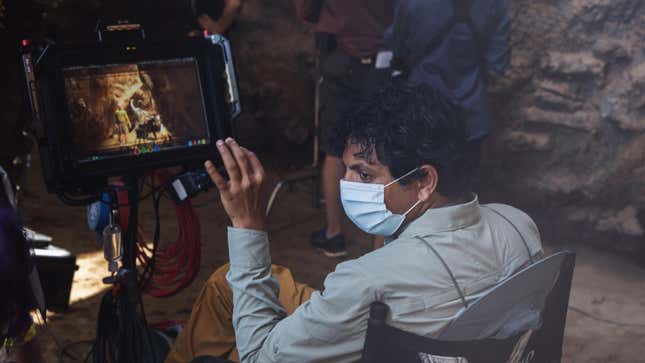
io9: Last question, like you said, you had to push this movie because of covid. But beyond that, it’s filmed mostly on a beach, in another country, there are so many difficult things. What was the most difficult thing about making Old and how did you get past it?
Shyamalan: It was incredibly difficult. I make small movies. These are small movies. They literally have an end. The money’s out and that’s it. So we just have to figure out how to do it in that amount of money. That’s it. And when you’re shooting in a pandemic, I made the decision to pay for all of the safety features to shoot in the safest way possible. We made our own lab. I paid for the whole hotel. All these things that I wasn’t anticipating doing. We were super stressed and doing it in the hurricane season and just all of it outdoors on a beach. Everything on the beach every day. We’re weather-dependent every single day. We’re wave-dependent. If there’s a storm that happens 100 miles away, we’re going to get hit two days later, we know it in advance. So it’s like the waves are going to come crashing up and how to be nimble and all. There was so much respect for nature. We did this ceremony when we finished—everybody, the cast and crew went and put flowers in the ocean and thanked the ocean. It was a local tradition to thank the ocean and the beach for letting us be there and boy, was that the truth. The beach allowed us to be there for that time period and make that movie.
That movie, Old, opens on Friday. It’s excellent but not for the faint of heart. You’ll hear more about that from us soon.
Wondering where our RSS feed went? You can pick the new up one here.
